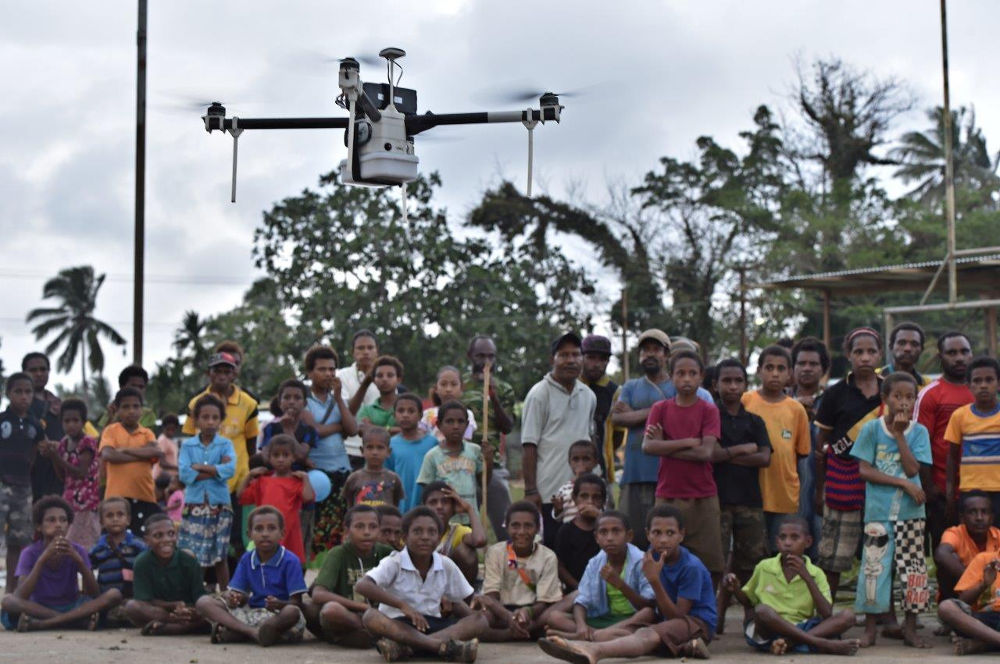
Drones have been trialled by Medecins Sans Frontières (MSF) to combat a centuries-old disease that has crippled communities in one of the most untamed wildernesses on earth.
Papua New Guinea is experiencing an epidemic rate of a disease that most Western countries overcame long ago. Tuberculosis (TB) kills one Papua New Guinean every two hours, and with 15,000 new infections a year, health authorities are struggling to contain the disease as it rages through the remote reaches of the island nation.
"One of the big challenges is difficulty for patients to access a laboratory for a proper diagnosis," Eric Pujo, program manager for MSF in Papua New Guinea, told VICE News. "We decided to implement a pilot project with a company called Matternet in April 2014, and we contacted them to see what the feasibility would be of using Unmanned Aerial Vehicles (UAVs) to bring samples from remote areas to our laboratory for testing."
MSF this year began to help local authorities tackle TB in the country's Western Province. According to a Papua New Guinea government mission to the region, the region has one of the worst TB rates anywhere in the world, but it's the landscape that throws up even bigger challenges.
"You can imagine the province as the biggest swamp in the world," Pujo said, "it's a very difficult location to access, and the best way to a community is often by boat through the swamps and then walking. To go to a larger hospital, for them, this journey can take several days."
The vast wilderness of Papua New Guinea is what makes it one of the last remaining bastions of TB. Dr Pieter van Maaren, the World Health Organization representative for the country, told VICE News in November that 40-50 per cent of Papua New Guineans don't complete their course of drug treatment. The drug treatment can take up to 12 months, involving several rounds of drugs and ongoing medical supervision.
87 percent of Papua New Guineans live rurally, and with medical facilities often several days' travel away from their communities, getting a correct diagnosis and then sticking to their treatment regimen can be impossible.
"It's an issue because if you stop your treatment you could create a drug resistant strain of TB, then you have to use a whole other combination of drugs, on a long period of treatment, like 20 months, to get rid of the disease," said Pujo. "And you risk taking drug resistant TB back into your community and spreading it there."
Pujo turned to California-based UAV company Matternet to try a new way of linking sufferers of TB with the medical centers that could provide diagnosis and treatment.
Using Matternet drones piloted through smartphones, the two organizations flew dummy cargo from communities MSF has been treating to medical facilities around the region.
The longest test flight completed flew cargo over swamps and jungle for 26 miles in a mere 55 minutes, including a recharge stop. By car, the journey would have taken at least four hours. But ambitions for the technology extend far beyond bypassing a lengthy car trip.
Andreas Raptopoulos, CEO of Matternet, wants to create networks of drones across developing countries like Papua New Guinea.
"Most of these people have never seen one of these things, at least in the flesh," Raptopoulos said in an interview with Business Insider. "But it's amazing, the amount of joy it generates. It basically breaks with all your assumptions."
Raptopoulos said he believes that by creating a network of drones that each carry a payload for a short distance to hubs where other drones can take over, payloads will be able to travel vast distances, in parts of the world with little to no infrastructure.
Just as the adoption of the mobile phone has allowed developing countries to leapfrog traditional communications infrastructure, Matternet says drones could enable them to bypass elements of conventional transportation and delivery systems.
"We need to explore these new technologies to change how we think about our projects and come up with solutions," Pujo said. "Hopefully, after a bit more collaboration, and continuing to work on the feasibility test, this can be part of our response to TB in the Western Province. It's something that can also be be used in the future in MSF contexts, depending on of course, the acceptance of the population and of governments."
Source: VICE News